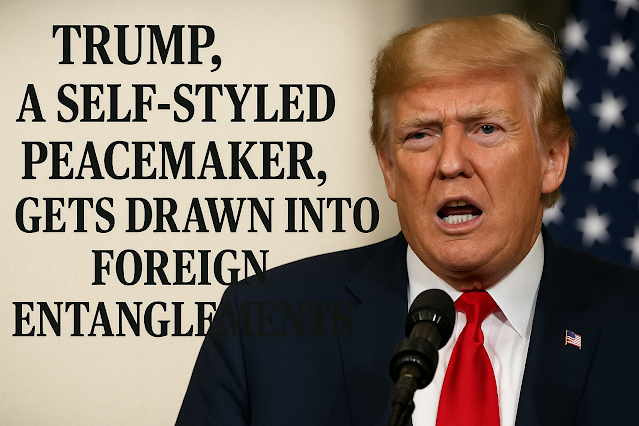Introduction: Trump’s Dual Image in Global Affairs
Former President Donald J. Trump, a leading contender in the 2024 presidential race, has long marketed himself as a political outsider and a peace-focused leader. His “America First” doctrine emphasized ending endless wars and minimizing U.S. involvement in foreign conflicts. However, recent rhetoric and policy hints suggest a more complex narrative is emerging—one that challenges his peacemaker persona and reveals renewed interest in global intervention.
From ‘Endless Wars’ to Renewed Aggression: What Changed?
During his presidency (2017–2021), Trump repeatedly promised to bring American troops home and dismantle what he called “the military-industrial complex.” Yet now, his campaign speeches suggest a return to aggressive posturing, especially in relation to global hotspots like Iran, Ukraine, and Venezuela.
At a recent Ohio rally, Trump proclaimed:
“We won’t be wasting lives in endless wars, but if they touch one American, we will hit back ten times harder.”
These words strike a chord with his base, who support a strong national defense. But for foreign policy observers, they hint at a shift toward a more interventionist stance—a significant contradiction to his earlier anti-war rhetoric.
Trump’s Foreign Policy Strategy: Peace Through Strength or Strategic Aggression?
Trump’s evolving stance fits into a broader narrative he has carefully crafted: that only he can secure global peace by projecting American strength.
Key recent positions:
👉Iran: Trump threatened “swift retaliation” after U.S. contractors were targeted by Iranian proxies in Iraq.
👉Ukraine: He promised to “end the war in 24 hours” through undisclosed negotiations while also suggesting he’d ramp up military aid if necessary.
👉Venezuela: Trump hinted at renewed support for opposition forces, reigniting questions about U.S. involvement in Latin America.
Political analysts say this approach attempts to thread a needle—appeasing isolationist voters while signaling toughness abroad.
Internal Campaign Divides: Who’s Advising Trump Now?
One reason for Trump’s shifting rhetoric may lie in his inner circle. His current advisers reportedly include a mix of former military officers, business leaders, and non-traditional diplomatic voices. Some urge strategic restraint, while others advocate for a more muscular foreign policy.
“Trump has always relied on instinct over ideology,” says Dr. Lila Moore of the Center for Strategic Policy. “But as the global landscape grows more dangerous, his ability to navigate nuance will be tested.”
The NATO Factor and European Diplomacy
Despite previously calling NATO “obsolete,” Trump has recently walked back that position. Now, he suggests the alliance should “step up” in Ukraine—even pushing for faster military resolutions while hinting at possible negotiations with Russia.
This contradiction raises eyebrows among European allies, who are still uncertain about Trump's commitment to multilateralism. Diplomats in Brussels and Berlin have expressed concerns over Trump’s unpredictable style, warning that a return to his leadership could destabilize carefully built alliances.
Criticism and Caution: Reactions from U.S. Officials
Current and former U.S. officials are also taking note. Retired General Mark Thompson, speaking on national television last week, warned:
“Trump’s mixed messages could embolden adversaries and confuse our allies. Consistency in foreign policy is essential — especially now.”
The Biden administration has remained largely quiet on Trump’s recent comments but signaled concern behind closed doors. A senior official told reporters anonymously that “foreign policy is not a campaign slogan—it has real consequences.”
2024 Elections and Global Tensions: What Voters Should Watch
As the 2024 election season unfolds, Trump’s foreign policy will be a critical issue—not just for Americans but for the global community. His base may cheer his aggressive soundbites, but voters concerned about diplomacy, stability, and global standing are watching closely.
Conclusion: Peacemaker or Provocateur?
Donald Trump’s political brand has always included a healthy dose of contradiction. He positions himself as an anti-war candidate who threatens overwhelming military force. As foreign entanglements once again loom large, Trump’s self-styled image as a peacemaker faces a serious stress test.
Whether this tightrope act wins him votes—or raises fresh concerns—will depend on how closely Americans (and the world) scrutinize his evolving rhetoric versus his real-world record.





0 Comments